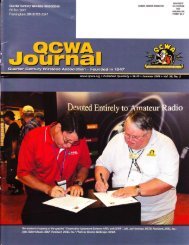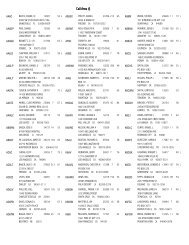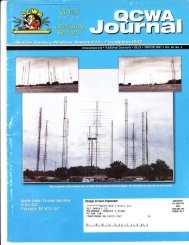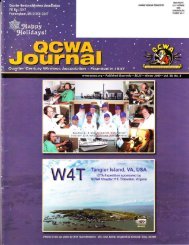G[mloulnal - Quarter Century Wireless Association
G[mloulnal - Quarter Century Wireless Association
G[mloulnal - Quarter Century Wireless Association
You also want an ePaper? Increase the reach of your titles
YUMPU automatically turns print PDFs into web optimized ePapers that Google loves.
Y{hich call sign?<br />
Q. When my ham friend operates my station, which call sign<br />
should he use, his or mine?<br />
A. The one person eligible to answer your question correctly is...<br />
youl Section 97.119(a) of the FCC rules says, in effect, that the<br />
call sign transmitted in the station identification announcement<br />
must be that assigned to the station. It is for you, the owner of the<br />
transmitting apparatus, to first answer the underlying question:<br />
"Under the authority of which of our station licenses am I going<br />
to allow my station apparatus to transmit?" Your answer, therefore,<br />
will determine which call sign must be used. It will also<br />
determine the extent of your liability. IV{ake your choice carefully.<br />
Q. What are my choices?<br />
A. The rules allow you two choices. Moreover, there is no rule<br />
that requires you to make your amateur station or its apparatus<br />
available to any other amateur operator.<br />
Choice Number One: The station transmits your call sign in the<br />
station identification announcement. With this choice, you are<br />
the station licensee, responsible for the proper operation of the<br />
station, as it says in Section 97.103(a). You and your friend are<br />
both responsible for performing properly the duties of its control<br />
operator. Note that Section 97.103(b) says that the FCC will presume<br />
that you, the station licensee, are also the control operator<br />
unless there is documentation to the contrary. An entry in the<br />
station's log should suffice.<br />
Choice Number Tlvo: The station transmits your friend's call<br />
sign in the station identification announcement. Under this choice,<br />
your friend alone is responsible for performing properly the duties<br />
of both the station licensee and its control operator. You simply<br />
make your apparatus available to your friend.<br />
Q. Which is the better, Choice Number One or Two?<br />
A. The answer to that question depends upon your reason for<br />
allowing your friend to use your station apparatus. For instance,<br />
if you want to obtain QSL cards for your station's collection or<br />
improve your station's score in an operating contest, your better<br />
choice would be Number One. Otherwise, with Choice Number<br />
Two, any resulting QSL cards will be addressed to your friend's<br />
station and contest points will be attributed to your friend's station.<br />
Q. Which is the better choice when my friend is not very<br />
familiar with the FCC rules?<br />
A. The best choice would be to withhold the use of your station<br />
and its equipment until you are confident that it will be used properly.<br />
Beyond that, Number Two would be a much better choice<br />
t4 QCWA fournal - Summer 2001<br />
than Number One because - in view of a greater chance of a<br />
violation of the rules occurring - you would not be at risk. your<br />
friend would take complete responsibility for all violations of the<br />
FCC rules. The worst choice would be Number One because you<br />
would be fully responsible although you are not the control operator.<br />
Section 97 .103(a) says that even where the control operator is<br />
a different amateur operator than the station licensee, both per-<br />
sons are equally responsible for proper operation ofthe station.<br />
Q. If my friend causes my station to transmit on a frequency<br />
channel outside the ham bands, whom will the FCC consider<br />
to be in violation of its rules?<br />
A. The FCC holds responsible the licensee of the station whose<br />
call sign was transmitted in the station identification announcement.<br />
Under Choice Number Two, therefore, your friend alone is<br />
responsible. Under Choice Number One, you alone are responsible<br />
unless you have a document showing that your friend was<br />
the control operator at the time of the infraction. If you have such<br />
proof, you are both responsible.<br />
Q. I am an Advanced Class operator. Which call sign should<br />
I use when f operate my friend's station. He is a General<br />
Class operator.<br />
A. If your friend stipulates Choice Number Two, your station's<br />
call sign must be given in the station identification announcement<br />
and your frequency privileges are those authorized to Advanced<br />
Class operators in Section 97.301(c). In effect, your friend<br />
makes his or her station apparatus available to you and you take<br />
complete responsibility for the proper operation of the station.<br />
Under Choice Number One, however, your friend designates you<br />
merely as the control operator of his or her station. In this case,<br />
your privileges are limited to those authorized to General Class<br />
operators by Sections 9"73U@) and (d) unless you include your<br />
station's call sign after that of your friend's call sign when making<br />
the station identification announcement.<br />
Q. There is a club station at our school. I want use it to work<br />
DX with it using my own call sign so that I can get some QSL<br />
cards from foreign countries, but the license trustee won't let<br />
me. He says that we must always use the club call sign. Can<br />
he do that?<br />
A. Yes, assuming the licensee trustee is in charge of the station<br />
apparatus. He has selected Choice Number One and makes the<br />
apparatus available to you merely as the control operator of the<br />
club station.<br />
Q. At our club's Field Day operation last June, there were six



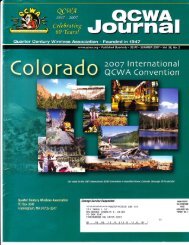
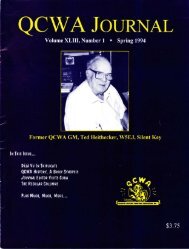
![11{J hI EfifSIt]E I]E - Quarter Century Wireless Association](https://img.yumpu.com/11816560/1/190x245/11j-hi-efifsite-ie-quarter-century-wireless-association.jpg?quality=85)
